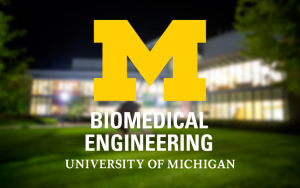Presented By: Biomedical Engineering
BME Ph.D. Defense: Thomas A. Davidson
Interface Engineering through Adhesion and Remineralization for Dental Composites using Mineral Binding Peptides

Nearly 90% of adults in the US will develop dental caries needing treatment with dental restorations within their lifetimes. An increasing number of restorations are done using composite rather than amalgams. Dental composites have some benefits, but the longevity of these restorations is shorter (5 to 7 years) than amalgams (10+ years). The leading cause of dental restoration failure is development of secondary caries. Secondary caries is decay at or near the margins of dental restorations that occurs when bacteria or acid infiltrate the interface and cause demineralization. A reduction in infiltration would prevent the development of secondary caries. The focus of this dissertation is the development of a method for improving the integrity of the interface using peptide engineering. It was hypothesized that a mineral binding peptide identified via phage display for affinity to apatite could be modified to A) chemically incorporate with dental composites during polymerization and increase bond strength and B) act as an anchor for a mineralization promoting peptide to increase remineralization at the interface.
First, this thesis describes the characterization of VTKHLNQISQSY (VTK) peptide and phosphorylated variants (pVTK) for their affinity to dentin and enamel and the increase in adhesion strength at the nano-scale. pVTK showed strong affinity to dentin and enamel, and both VTK and pVTK exhibited strong adhesion to dentin and enamel at the nanoscale under dry and wet conditions. Binding at the nanomolecular level translated to modest shear bond strength (SBS) increases at the interface when pVTK (7.4%) was modified with a cysteine that incorporated with the methacrylate-based bonding agent and composite during polymerization. Using a competitive risk model incorporating failure mode and SBS, a small increase in bond strength (VTK: 3%; pVTK: 10%) was observed.
The second modification to VTK was the addition of a remineralization domain using 8DSS, a known remineralization peptide consisting of 8 repeats of Asp-Ser-Ser (DSS). The dual-functioning peptide (VTK-8DSS) was applied to in vitro cross sections of dentin and enamel and an in situ model of class V dental restorations. Mineral deposition and quality were assessed over 7 days in remineralization solution. VTK-8DSS increased the mineral quality (recovering 75% of young’s modulus and hardness compared to 50% of 8DSS control) determined using nanoindentation over the 7 day time course of the study.
These modifications were also analyzed under challenging conditions for their protective effect to the interface. VTK and pVTK doped composites were exposed to thermal cycling and had a 43% and 49% reduction in microleakage as measured by silver nitrate penetration using micro CT. Cross sections and dental restorations were used to assess the function of VTK-8DSS in artificial saliva containing proteins that competitively bind to dentin and enamel and an acidic cycling model where samples were exposed to acid every day in addition to remineralization solution. VTK-8DSS in both artificial saliva and acidic cycling models showed a slight increase in mineral deposition (95% and 95% recovery) compared to 8DSS (80% and 50% respectively) and a large increase mineral quality (70% vs 10% and 60% vs 30%).
Taken together, the data in this dissertation demonstrates the ability to engineer interfacial surfaces using peptides derived for their affinity to specific tissues. This system could be applied more broadly to improve the interactions or integration of any number of biomaterials that directly interface with native tissue.
Date: Friday, December 10, 2021
Time: 8:00 AM EST
Zoom: https://umich.zoom.us/j/97816028147 (Zoom link requires prior registration)
Chair: Dr. David Kohn
First, this thesis describes the characterization of VTKHLNQISQSY (VTK) peptide and phosphorylated variants (pVTK) for their affinity to dentin and enamel and the increase in adhesion strength at the nano-scale. pVTK showed strong affinity to dentin and enamel, and both VTK and pVTK exhibited strong adhesion to dentin and enamel at the nanoscale under dry and wet conditions. Binding at the nanomolecular level translated to modest shear bond strength (SBS) increases at the interface when pVTK (7.4%) was modified with a cysteine that incorporated with the methacrylate-based bonding agent and composite during polymerization. Using a competitive risk model incorporating failure mode and SBS, a small increase in bond strength (VTK: 3%; pVTK: 10%) was observed.
The second modification to VTK was the addition of a remineralization domain using 8DSS, a known remineralization peptide consisting of 8 repeats of Asp-Ser-Ser (DSS). The dual-functioning peptide (VTK-8DSS) was applied to in vitro cross sections of dentin and enamel and an in situ model of class V dental restorations. Mineral deposition and quality were assessed over 7 days in remineralization solution. VTK-8DSS increased the mineral quality (recovering 75% of young’s modulus and hardness compared to 50% of 8DSS control) determined using nanoindentation over the 7 day time course of the study.
These modifications were also analyzed under challenging conditions for their protective effect to the interface. VTK and pVTK doped composites were exposed to thermal cycling and had a 43% and 49% reduction in microleakage as measured by silver nitrate penetration using micro CT. Cross sections and dental restorations were used to assess the function of VTK-8DSS in artificial saliva containing proteins that competitively bind to dentin and enamel and an acidic cycling model where samples were exposed to acid every day in addition to remineralization solution. VTK-8DSS in both artificial saliva and acidic cycling models showed a slight increase in mineral deposition (95% and 95% recovery) compared to 8DSS (80% and 50% respectively) and a large increase mineral quality (70% vs 10% and 60% vs 30%).
Taken together, the data in this dissertation demonstrates the ability to engineer interfacial surfaces using peptides derived for their affinity to specific tissues. This system could be applied more broadly to improve the interactions or integration of any number of biomaterials that directly interface with native tissue.
Date: Friday, December 10, 2021
Time: 8:00 AM EST
Zoom: https://umich.zoom.us/j/97816028147 (Zoom link requires prior registration)
Chair: Dr. David Kohn